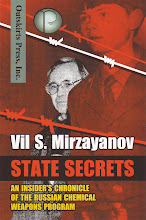I would like to thank Mr. Porteous for his very thoughtful and comprehensive book review. Mostly it is very positive and the attention paid was refreshing after long time efforts by some to try to silence my story. Just one small comment to your remarks:
"...is a reminder of how complicated and contrary a creature human beings can be."
If this is about me, my reply would be that I devoted 20 years of my life to put the chemical agents of Novichok series under international control. I never gave up. I decided to go public only after exhausting all other possible means. When the formulas and even the technological methods of production of all known chemical agents are already known and published, why would the publication of the formulas of the Russian Novichok chemical agents in my book be considered excessive?
There is no rational explanation for this restriction. To try to portray terrorists as gourmets in field of chemical weapons, who allegedly select exactly the Novichok agents for their goals, while passing up more simple and cheaper ones, is also not logical.
To suppose that "proliferators" can use Novichok formulas to make their chemical arms is also not convincing. Exactly which of these proliferators are big connoisseurs in field of chemical weapons? North Korea? This state is the worst knock-off version of the old Soviet Union, which took more than 10 years to completely start up the production of Agent 33. Two other states (Syria and Egypt) don't have significant chemical industry. Sure, there is Israel. This state can probably produce any weapon that it wants without any formulas from my book. While I was imprisoned in Russia for just writing in general terms about Novichok agents, several of my colleagues from GosNIIOKhT escaped to Israel. They didn't raise Novichok problems in media. Nevertheless, nobody restricted them from sharing their knowledge with the government of their new country.
Probably, an idea to put Novichok series under international control proposed by my friend Mr. Tucker, by including the mass-specters of them into chromato-mass-spectrometers electronic library of OPCW is not so bad one. Even, in reality, this would be the same as open publication of chemical formulas of them in media.
As Jonathan Tucker points out in his excellent, War of Nerves: Chemical Warfare from World War I to al-Qaeda, the Soviets did not feel the need to stockpile Novichok-5 precursors. Their plan was to mobilize the production lines of existing civilian facilities in wartime area."I couldn't find this sentence in Tucker's book. Nevertheless, it is logical to ask: who suggested this idea? The Russians? If so, there not too many people who trust them in this delicate area. If someone invented this, it does not even make good science fiction. I wrote many times and will continue to repeat: Russians developed binary weapon A-232 to circumvent the CWC, and they never promised to produce it only “in wartime”. I think that once we have been cheated, we should not try to justify the manipulator's actions, but to fix the situation.
